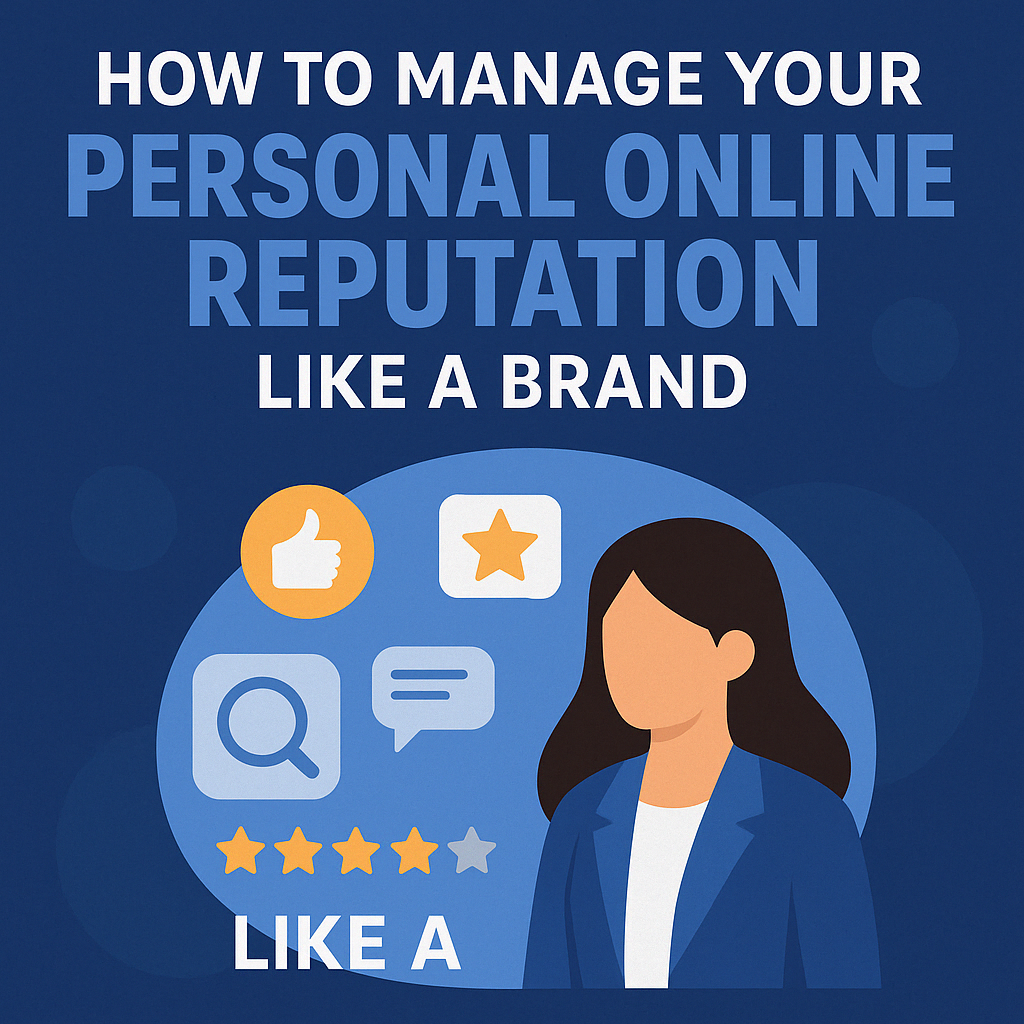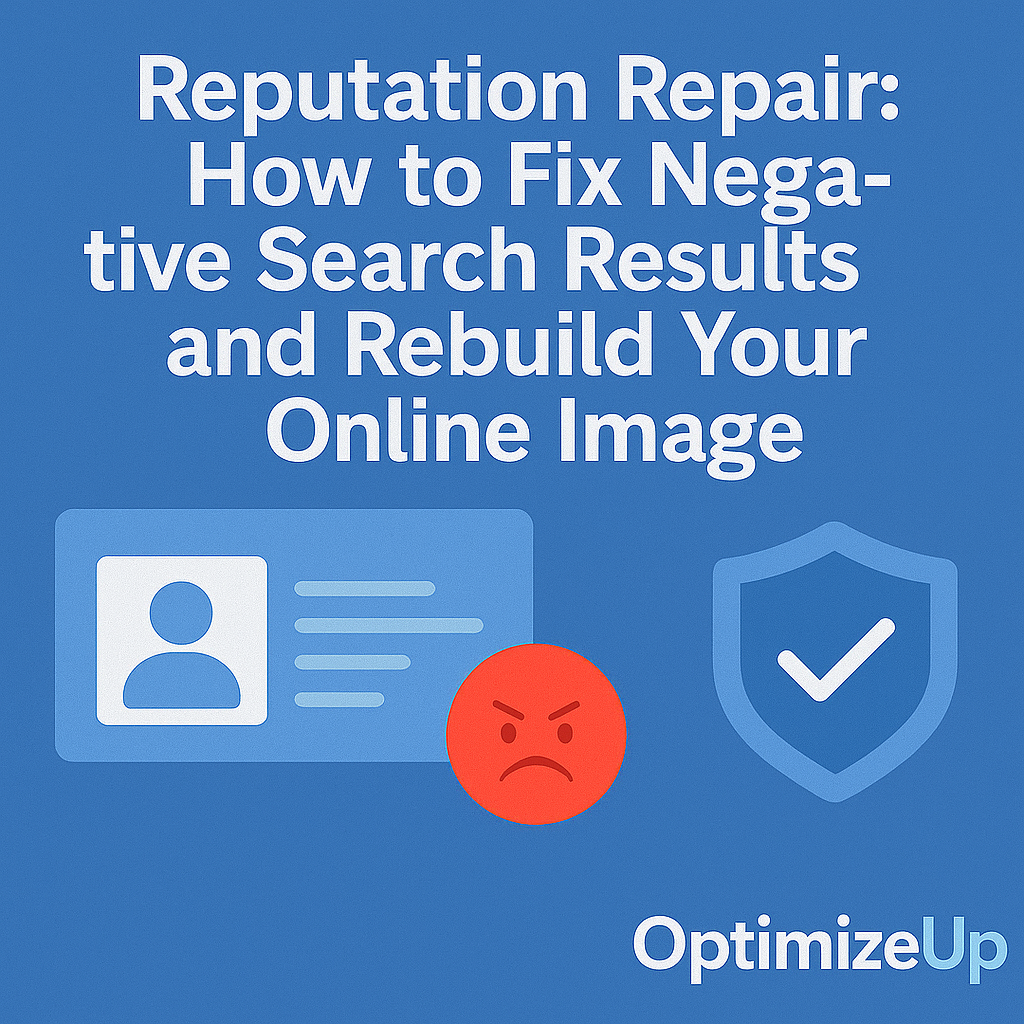Why Your Personal Online Reputation Matters More Than Ever
In today’s hyper-connected world, your online presence often makes the first impression—whether you’re applying for a job, attracting clients, building a network, or launching a business. According to CareerBuilder, 70% of employers screen candidates via online searches and social media.
Reputation is no longer just for brands—it’s personal. Managing your personal online reputation ensures that when someone Googles your name, they find content that is accurate, positive, and reflective of your values and goals.
A powerful personal brand can lead to media appearances, new business opportunities, career advancement, and greater influence in your niche.
Building a Personal Reputation Strategy Like a Brand
Step 1: Audit Your Current Online Presence
✅ Google Yourself
- Search your name in incognito mode
- Check multiple pages of results
- Evaluate content tone, accuracy, and visibility
✅ Review All Social Media Accounts
- Ensure consistency in your name, bio, and profile pictures
- Remove or hide posts that may be controversial or outdated
- Evaluate past posts through the lens of today’s professional expectations
✅ Examine Your Mentions
- Use tools like Google Alerts, BrandYourself, and Mention
- Monitor review platforms, forums, blogs, and news sources
Conducting a full audit allows you to understand your current reputation baseline and highlights areas to improve or strengthen.
Step 2: Define Your Personal Brand Message
Think of yourself as a brand. What do you stand for? Who is your target audience? What value do you provide?
- Personal Brand Pillars: (e.g., Leadership, Creativity, Integrity)
- Tone and Style: (e.g., Conversational, Authoritative, Inspirational)
- Goals: (e.g., Career advancement, Speaking gigs, Client acquisition)
Once you define your core message, use it to guide all content creation and engagement decisions.
Examples of Personal Brand Messaging:
- “I help startups scale faster through lean marketing systems.”
- “Bringing empathy, creativity, and innovation to modern leadership.”
- “Building a stronger future through technology and mentorship.”
Step 3: Claim and Optimize Online Real Estate
🌐 Create or Update Key Platforms:
- Personal Website: Register a domain with your name (e.g., JohnDoe.com)
- LinkedIn: Use a professional headshot, clear headline, and keyword-rich summary
- Twitter / X: Use for thought leadership and industry engagement
- Instagram / TikTok: Showcase lifestyle, achievements, or behind-the-scenes content
- Medium / Substack: Write content aligned with your expertise
📋 Platform Checklist:
- Consistent branding across all platforms
- Verified accounts where applicable
- Proper privacy settings where needed
- Unified contact info, biographies, and visual branding
“Treat your online profiles like professional storefronts—clean, polished, and aligned.” — Forbes
Content Is Your Reputation Currency
Publish Authoritative and Intentional Content
✍️ Blog Posts and Articles
- Share insights, lessons learned, or industry predictions
- Optimize each post with your name, location, and target keywords
- Syndicate to platforms like Medium or LinkedIn for added visibility
🎥 Video Content
- Host a YouTube channel or post reels showcasing skills, testimonials, or educational content
- Include closed captions and transcripts for SEO
- Use storytelling to humanize your experience and personality
📚 Guest Contributions
- Write for reputable outlets like LinkedIn, Medium, Entrepreneur.com, or trade publications
- Link back to your website and use consistent author bios
Diversify Your Media Formats
- Podcasts and interviews
- Infographics and slide decks
- Case studies and testimonials
Creating content in multiple formats helps engage a wider audience and increases the chance of ranking in various search verticals (video, news, images).
Managing Negative Content and Search Results
1. Suppress Unfavorable Results
- Publish new, SEO-rich content regularly
- Build backlinks to positive content
- Use schema markup for personal profiles and reviews
- Focus on internal linking and domain authority
2. Contact Webmasters
- Politely request removal of outdated or misleading information
- Use WHOIS Lookup to find contact info for smaller sites
- Present documentation or correction requests clearly and professionally
3. Legal Remedies
- For defamation, impersonation, or non-consensual content, consider legal action
- File requests with platforms and Google for removal under terms violations
- Leverage copyright laws for unauthorized photo or video use
Maintaining a well-managed personal online reputation is also about mitigating future risks. Set content alerts and review your social media history every 6–12 months.
Personal Reputation Monitoring Tools
Monitoring allows you to stay one step ahead of potential reputation threats and proactively adjust your strategy.
For high-risk individuals (executives, public figures, professionals in sensitive industries), investing in AI-driven monitoring software may be worthwhile.
Reputation Through Relationships: How You Engage Matters
Respond to Messages and Mentions
- Acknowledge compliments and address criticisms respectfully
- Stay active in your niche communities
- Prioritize timely, thoughtful responses
Contribute to Discussions
- Comment meaningfully on posts in your field
- Join industry groups and forums
- Offer value before promoting yourself
Share Thoughtfully
- Focus on content that adds value
- Use your platform to amplify other respected voices
- Avoid excessive self-promotion and clickbait
“The way you interact online is just as influential as what you post.” — Harvard Business Review
Professional Online Reputation Tactics
Advanced SEO for Your Name
- Use your full name in page titles, headers, alt tags, and URLs
- Link all content together (internal linking)
- Optimize for “[Your Name] + Industry” or “[Your Name] + City”
- Use structured data (schema.org/Person) for enhanced visibility
Authority Building
- Earn mentions and backlinks from credible sites
- Participate in interviews or podcasts
- Publish whitepapers or industry guides
- Partner with universities or respected organizations for bylines
Thought Leadership Assets
- TEDx Talks, public webinars, panel appearances
- Use sites like Muck Rack to connect with media
- Create a press page on your website to catalog appearances
How Optimized Up Helps Manage Your Personal Online Reputation
Whether you’re recovering from negative press or proactively building a professional presence, Optimized Up provides:
- Strategic content development and SEO for personal branding
- Search result suppression and reputation repair
- Reputation monitoring and reporting dashboards
- Removal support for defamatory or outdated content
- Guidance on developing and executing a reputation-first content calendar
Request a personalized assessment today and take full control of how the world sees you.
Frequently Asked Questions
Typically 3–6 months of consistent publishing and optimization can produce visible results. Suppression of negative content may take longer.
Sometimes. If it violates terms of service, privacy rights, or defamation laws, it may qualify for removal. Otherwise, suppression is the best strategy.
If your livelihood or career is being impacted by negative results, investing in professional support may be necessary and cost-effective long term.
Absolutely. Your own domain ranks well and gives you total control over the content and messaging tied to your name.
Yes. Most hiring managers conduct online searches during screening. Having a strong personal presence gives you an edge.
Branding is what you intentionally put out. Reputation is what others perceive based on what’s out there. Both need to be aligned for maximum impact.
MLA Citations:
Bradley, Nicole. Reputation Reflex: How to Take Control of Your Name Online. Elevate Media, 2024. “Managing Your Online Presence.” Harvard Business Review, 2021, hbr.org. “Employers Are Looking You Up Online.” CareerBuilder, 2018, press.careerbuilder.com.





